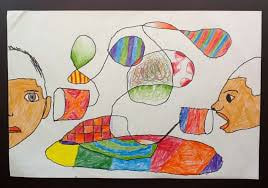|
Like the classic game of telephone, how many of our grievances toward mankind are due to a communication breakdown?
If you’ve read Trevor Noah’s autobiography (you should) you will remember the story “Go Hitler!” story. Innocent intentions trying to ameliorate years of cultural history and misunderstandings end in perpetuating a sense of disrespect from both sides. Without the grace of time and mediation, this hilarious, but severly painful and unfortunate misunderstanding could never be seen for just that: a misunderstanding. Today, I read an article by Annie Pfiefer in the New York Times, where she grapples with the needs of our children, and therefore our culture, to bump up against dissent and disagreement, challenges and competition, and work it out. I agree with Annie that our culture has suffered a serious ineptidute in thoughtful conversation, especially political conversation. So when it comes time to think about politics, we are seriously truncated. A reality that only felt like a sort of fuzzy haze until I lived in Mexico and travelled to Europe as a teenager. They knew how to talk about politics, weren’t afraid to disagree, and could seamlessly move from topic to topic to dancefloor without the bitter rancor two Americans might feel who represented the opposite ends of the political spectrum. Sure, we love to spout our opinions, just not to your face. America is like a big teenager. A bully when threatened, but just dying to be liked on the inside. We want celebrity, but not controversy, heavens no! For many years, I’ve lived in a culture that would rather “stay cool” and just hang out, than stand up for what was right, speak out against what is wrong, and ruffle feathers. Perhaps Annie is right, generations of helicopter parents that have intervened in childhood conflicts and not given our children the right to defend themselves, find their voice, and find that friendship can still follow a fight. Annie, are you saying that expressing one’s true thoughts and emotions is the key to conversation with content and an empowered populace? That children saying and doing cruel things on the playground are acting within their nature, and in order to teach them to work it out we need to allow them to act it out? It sounds too dangerously close to the idea that Political Correctness has a stranglehold on our culture. It is a false dichotomy to posit that parents either intervene or let children duke it out. I don’t think political correctness on the playground is choking our children’s development. How about teaching our children, our students, and our community leaders common tools of communication? How about if we begin with teaching children how to recognize their needs, and to communicate them without having to engage in combat? How about everytime that we recognize we have a need, we recognize that others also have needs? How about teaching non-violent communication techniques in school, and practicing it throughout K-12, from group projects to debate classes? What if we valued student’s psychological capital more than their test scores? What if we implemented programs that primarily addressed how to recognize, communicate, and address needs, as individuals and communities? What if we taught non-violent communication in schools, and studied the effects it has on students’ psychological capital, namely hope, optimism, self-efficacy, and resiliency? What if, as a adults reflecting on how to better communicate with one another, we began to target our conversations more toward how to play a fair game and less toward blame and shame? I think we might decide that our education and economic systems are choking on a lack of compassion, not too much PC.
1 Comment
|
Vertical Divider
About the authorObservations, reflections, questions, and personal inquiries on how to shift our collective mindset to one that fulfills our human potential as innovative, compassionate, and joyful. Archives
January 2022
Books
|

 RSS Feed
RSS Feed
